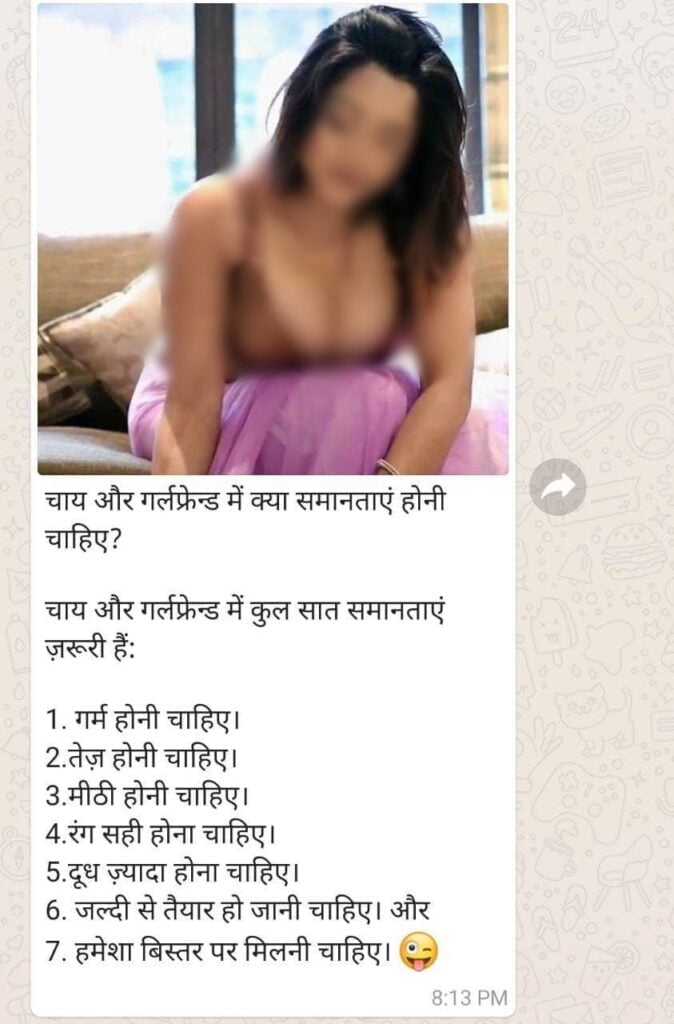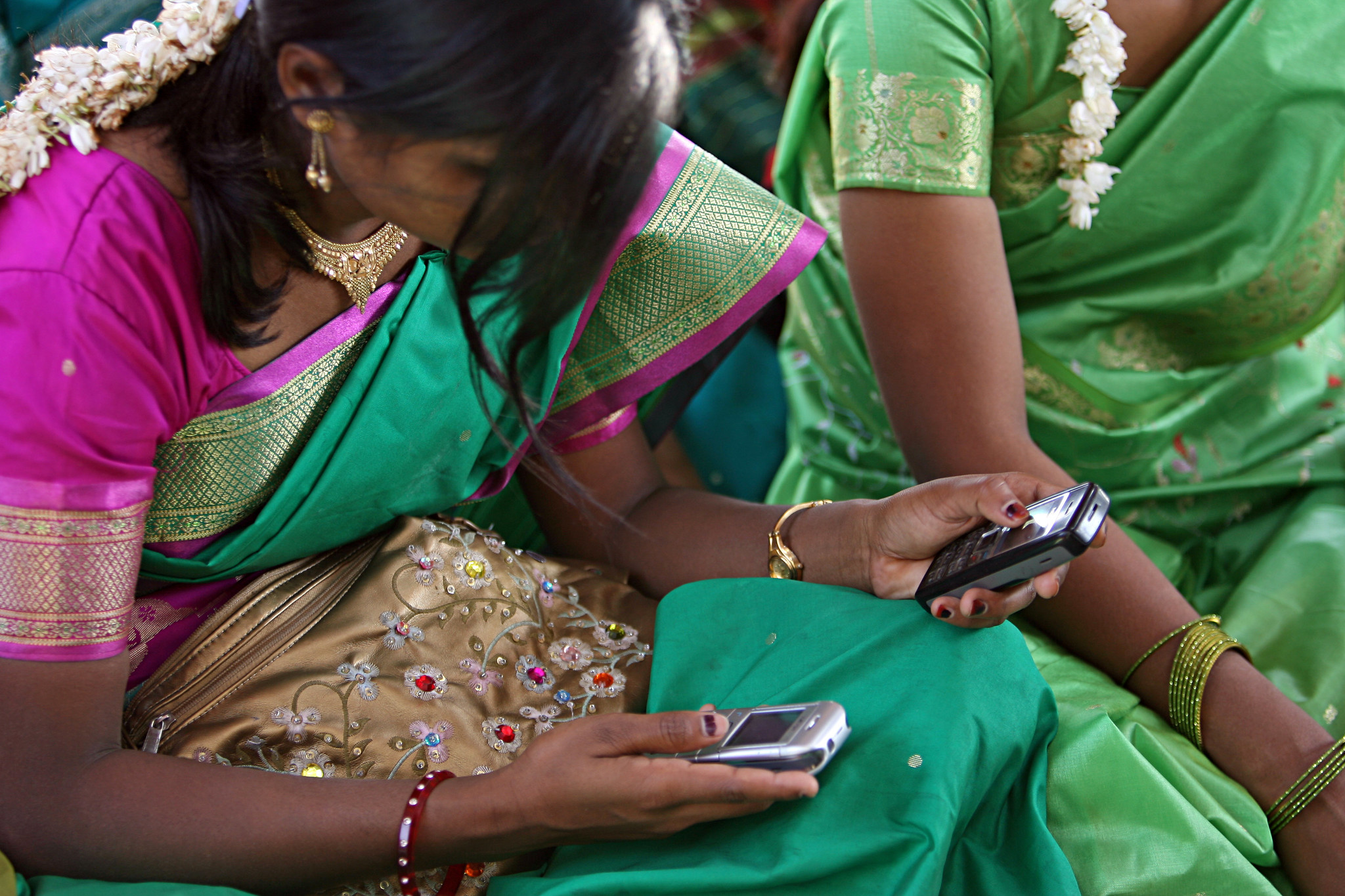Trigger Warning: Graphic images and text messages objectifying women
A male acquaintance V. from my circle of good friends texts me one late evening, “What was the shade of the lipstick you were wearing?” Surprised, I check and unsuspectingly text back, “Strawberry”. “So will I get the taste of strawberry if I were to kiss you?” reads his next text. I am stuck between deciding on whether to undercut him with a witty rejoinder or call him out for his impropriety. I take the latter course and pat comes the reply, “Hey, you are not as cool as I had thought.” He professes to be a feminist and has the greatest “regard” for women and proclaims he is committed to “smashing patriarchy and sexism” in all forms. In our subsequent meetings, I find it a little awkward to talk to him with the same candour and one day I get a text, “Our friendship should not lose the warmth it once had.” I am somehow unable to summon that warmth.
The other day a close friend M. with whom I had not discussed this incident with, texted me: You write about so many things; I think you should write about this and along came an image in my Whatsapp window:

Assuming that she must have received this on a WhatsApp group, wherein a lot of misogynistic posts are circulated, I texted back saying she should leave the group. What she said next whelmed the daylights out of me as did the image that followed:

This wasn’t being posted on a group. This was a man from her social circle sending her these images; someone she was cordial with, the father of her college-going daughter’s friend who lived in the neighborhood.
This reminded me of what I had pushed under the carpet and kept under wraps. A voiceover artist from the entertainment industry whom I had absolutely idolised and had worked with on several occasions but now wanted to train under. He called me over for a demo session with one of his other trainees. After the demo, we had a casual conversation and somehow I got around to talking about Foucault and sexuality and then it digressed into non-monogamous relationships.
Also read: Peeking At ‘Privacy’—A Call For Better Cyber Laws Against Crimes Online
That conversation most clearly marked the beginning of a spate of messaging from him and what can only amount to inappropriate and non-consensual digital flirting. The images and videos had one thing in common: they were all sexually explicit images and videos of women with some witticism or rejoinder that was supposed to have a humorous effect.

All the messages objectified and sexualised the women and were deeply sexist and misogynistic. Once I wrote back saying, “This is sexist”, I was asked to “chill” and reminded this was “just for laughs”. I entirely dropped the idea of training under him and thankfully the lockdown helped as a pretext.
“Violence sometimes starts with a joke” says the home page of the Human Rights Channel of the Council of Europe. It goes on to say: “Individual acts of sexism may seem benign, but they create a climate of intimidation, fear and insecurity. This leads to the acceptance of violence, mostly against women and girls.” Among others, it condemns shaming and sexualisation of women and the use of sexist language and jokes. It affirms its contribution to an all-pervasive environment of oppression and a rapidly shrinking egalitarian cyberspace.
The problem seems to be more for women who are friendly with men and who have some radical and unconventional views about sex and sexuality or who challenge feminine stereotypes of modesty and propriety. When a woman openly talks about concepts such as consent, the female sexual autonomy, challenges the “virginity” imperative, engages in discussions pertaining to dismantling normative gender behaviour or portrays a worldview that accommodates the idea of non-monogamous relationships, a good number of men conclude that the woman is trying to indicate something.
When a woman openly talks about concepts such as consent, the female sexual autonomy, challenges the “virginity” imperative, engages in discussions pertaining to dismantling normative gender behaviour or portrays a worldview that accommodates the idea of non-monogamous relationships, a good number of men conclude that the woman is trying to indicate something.
It is not her views or take on a subject like this that matters but the fact that she has so unflinchingly aired them, despite being a woman. Since her candour and openness is diametrically opposite the censored expressiveness which is determined by a very clear demarcation of conversation considered “proper” for women in patriarchy, she is quickly categorised as a “forward” and “available” woman.
Available here could imply a lot of things – available could mean someone willing to engage in a sexually explicit conversation, someone with whom the man can “flirt” with or be “frank” with or a likely candidate for a fling. The full extent of inappropriate digital “flirting” ranges from something as seemingly innocuous as a sexist joke to a tiktok video or a gif of a sexualised woman to a video that can show intimate body parts or the act of sexual intercourse, always or mostly with some witty message embedded in it or a song playing in the background to create some kind of a humorous effect.
What is surprising in all this is the utter oversight of the inherent misogyny that is organic to these images and videos, the stereotyping of the woman and her derogatory projection as an object of consumption, intended to titillate.
Also read: TikTok In India: How Cyber Secure Is The App?
And very soon, the digital space becomes the ground to prey upon and hound the woman. It is as if the digital space acts as a guard or a shield for these predators where even if there is a backlash they will not have to “face” it. Being virtual empowers them and enables the otherwise ‘in line’ men to push and bully and sometimes even conveniently back out by professing that it was the “wrong window”.
A female friend S. tells me how a former classmate once commented on her Whatsapp profile photo through private chat saying how he loved her perfectly shaped breasts. They had just reconnected after twenty years through the school group and begun catching up.
Andy Favell cites instances and categorises the various kinds of gendered tyrannising that proves beyond a doubt that digital bullying and online sexual harassment is a reality. Unfortunately the instigator and the recipient often share a common circle of friends or can be acquaintances or colleagues or even members of extended family which makes it so difficult to call out cyber-harassers. In India, cyber stalking and online sexual harassment, both are punishable offenses but while the former is premised on the logic of an anonymous stalker, the latter restricts itself to workplace harassment. So the liminal space populated by harassers who can be friends or acquaintances remains shrouded.
A distant brother-in-law of mine who is in his early 60s, texted me once that he had had a dream in which I had a different name and he would address me by that name from now on but only in the digital space and that it should be a secret between us. It was an awkward situation for me as he had had my back in a number of situations. Plus, he would be perfectly cordial when we met face to face. I humoured him for some time but then I realised that when he addressed me by that alternate name in the digital space it gave him more leverage to make the conversation more intimate, till one day I had to call him out and remind him that I had a name and that I’d like him to address me by my name.
What is difficult is that it becomes nearly impossible to cancel these men since most of the time they are a part of our social circle. How does one cancel one’s best friend’s husband or cousin’s husband and how does one tell them about it? One might argue that there is always the recourse to block such people and exit such spaces but that is not the same as addressing the problem head-on. Even if one were to take recourse to these measures, the men who are engaged in cyber harassment will keep at it. And why should a woman, who has waged entire battles to assert her space and mobility in the public (including digital) arena choose to limit herself because a man cannot lower his gaze?
It may have a great deal to do with the gender socialisation process wherein cis-het men internalise hegemonic gender behaviour along with internalizing gender stereotypes which glorify men and berate women and men too who display feminine traits.
It may have a great deal to do with the gender socialisation process wherein cis-het men internalise hegemonic gender behaviour along with internalizing gender stereotypes which glorify men and berate women and men too who display feminine traits. Sexism is so inherent to patriarchy and normalised to such an extent that it ceases to be treated as offensive and women who take an offense are suddenly seen as men-haters and some firebrand variety of “feminists” who are out for men’s blood.
What needs to be addressed is that the men who are sending these forwards actually find them funny and appealing. And the women who are ignoring it are doing so not because they find it funny or appealing but because as Felicity Menzies puts it, they fear “the possibility of being discredited, penalised, humiliated, dismissed or rejected.” Women at the receiving end of sexism and cyberbullying will need to objectively respond by stating how exactly it offends them and the impact it has on them and their mental and emotional well-being as well as their dignity. Women will need to call out every time this happens and men will need to sit with the discomfort of this realisation that they have lost an opportunity to be a friend or an ally to a woman, along with the cordiality and the warmth they once shared.
Featured image source: Ritika Banerjee/Feminism In India
All inserted images as provided by the author.
About the author(s)
Dr. Shyaonti Talwar is an academician, researcher and a writer whose areas of interest include popular culture, social inequality, literature, mythology and gender. A poet and a performing artist, she loves creative expressions and feels it is important to voice her critical observations. Writing is therapeutic for her and makes her feel awake and alive. She can be found on LinkedIn and Twitter.





Hard hitting and an eye opener ❤️. This must be so disturbing. Thankfully this has not occurred to me. But I can imagine the stress and discomfort one has to carry along when this happens. How does one react out should react as you rightly pointed out is also difficult to decide.
Very good article indeed. ❤️
I absolutely loved this. Like you were speaking my mind. Patriarchy n Misogyny is so deep-rooted in our society that it gets my goat to see my sensible educated girl friends also laugh at sexist jokes. I have been told to chill n laugh it off by so many girl friends that it is not funny. Luckily most of them get it, that we normalise such behaviour by not calling it out. These so called jokes are made by men for men…to laugh at women to objectify them and to perpetuate the myth that women are stupid or silly. Sadly when we women keep quiet or forward such jokes we actually enable it. Such a pity! I have had so many fights with my friends over this.
Keep writing Shayonti and keep inspiring!
Absolutely brilliant…. I got so engrossed reading your article, my one kadhai of rasam that was on stove became one fourth. The entire house was smelling of rasam but I did not realize.
I absolutely admire your articles, A because you speak and write most of our minds and B because you put your thoughts in words so effortlessly and in a manner which is best suited.
Articles, especially like these, are the need of the hour and it is time that we don’t remain quiet and indifferent to these pejorative/derogatory remarks and views on women and their body, which are spreading extensively without realisation across generations be it in the digital world or outside. Ultimately, our children will also share/ imbibe the same views in future, if we do not put a full stop to them right away.
Keep voicing your opinions loud and clear shayonti and keep inspiring others too.
All the best 👍
It is an apt and incisive writeup. To write on a topic that is muddled with emotions and indignation in an objective manner requires much more than courage. People fail and keep failing as the instinct inside dominates the rational and humane thoughts and behavior. It becomes a grotesque phenomenon when it is sanctified and normalized in our daily lives. Often you find men proclaiming themselves as feminists, conservationists and this and that indulging in murkiest behavior. Gestures and signals are interpreted conveniently to suit their own instincts. often you need to tell your brothers, cousins and friends, many in their sixties to stop sharing lewd jokes and pictures. It is not even a matter of protest. It is much more than that. The emotional violence needs to be countered by all means and in the strongest possible way.
Some WhatsApp groups are just collections of wife jokes, misogynistic and vulgar content. If we try to educate them, they will educate us back about “humor.” I gave up trying to explain to anyone anymore. I just block them.
Very important article 🙌🙌🙌
Absolutely true. Many many men saturate the social space with their pervert sense of humor always at the expense of others – even other men. Those who cant crack such jokes enjoy the glut passively. ‘Reptilian hierarchies’ truly play out in such social media groups.
All these comments are so heartening. Thanks for speaking up and for continuing to inspire. Gives me so much hope
You have chosen a great topic to share your views or rather your experience on!!! You have penned it down so brilliantly. It’s not easy to share n talk about such experiences on such a huge platform,but this is the need of the hour!! Girls n women need to speak out at the right time to put an end to such devilish behaviors!!
Thank you so much for writing on such an important issue, and that too so very perfectly addressing the manner and method the patriarchal misogyny operates, and seamlessly objectifies and victimizes women and girls. In the present times it’s bit courageous what you have written but someone had to write it.
The virtual transmission of sexist texts, lewd images probably gives voyeuristic pleasure behind the digital screen; and with smartphones it has gone from bad to worse with the ease of replacing words with images.
I think almost all jokes are actually crafted for male gaze / male reader. Coz it’s strangely unbelievable woman shaming woman’s body!
The big question is though it’s illegal how come men dare to pass it.
What gives sanctity and legitimacy to such behaviour of men? When would we start analysing that and raising questions about that? Religious, cultural archetypes, romantic/sensual playfulness of gods and goddesses in heaven with hoors dancing around; pandavas/dropadi, dropadis/duryodhanas, sitas/ravanas, and glorification of krishnas normalisation (of voyeurism) and reinforcement of appreciated stories (as playful and naughty) and images through performances and cinema, natoriously gender insensitive, still evading censorship?
Look at the caste and class too, a dalit woman politician is orally and digitally more victimised as compared to an upper caste dominant party woman politician. Digital has manifested the festered mentality of a society in general. There are layers and layers of biases but what’s more important is we can’t afford to beat around the bushes for too long instead of reaching the roots and addressing of the problem collectively and holistically (caste or gender or any sort of discrimination) before it’s too late…
Thought provoking piece. While I was reading your piece, it reminded me one of my research proposal on the topic ” An Exploratory Analysis of Challenges under Cyberspace, especially for Women Users in India: Cyberbullying, Cyber Sexual Harassment, Cyber Sexual Assault, and Victimization of Female University Students and Female Faculty Members in Cyberspace”, which I submitted to National Commission for Women for grant. After reading your piece felt that my idea on cyber crime against women has a solid foundation and now your piece gave me confidence to go for it and convince authorities to fund such study.
Yes. Very much valid topic. This reminds me of I’m a Troll by Swati Chaturvedi
Mam… I can’t say this never happened to me and it’s true cyber bullying exists but nobody talks about it. Here my question is how to tackle this ?
And you put forth this issue in a very brave manner. I’m amazed 🙏🏻🙏🏻🙏🏻 thanks for writing and sharing this 😊
Hi Shyaonti, I’ve learnt so much from your writing over the years and this one represented my own (our own) experiences so vividly!
Everyday sexism gets so much more toxic on social media, even when the men there are those who we know offline as well. It is beyond irritating when they draw this binary between being feminist and being “cool” (hello, I’m not cool with this, I’m just disgusted and angry, and neither are you, you’re just offensive and chauvinistic). Also, how they conflate being liberal with being what they call “loose” (again, hello, the only thing loose here are the screws in your brain!).
I have very little tolerance for such toxic morons and usually do call them out, but sometimes I just ignore it. Reading your article makes me realize that we shouldn’t ignore it, that we need to call it out every single time. And call our their labels for us, too.
Thank you for writing about this! Everyday sexism gets so much more toxic on social media, even when the men there are those who we know offline as well. It is beyond irritating when they draw this binary between being feminist and being “cool” (hello, I’m not cool with this, I’m just disgusted and angry, and neither are you, you’re just offensive and chauvinistic). Also, how they conflate being liberal with being what they call “loose” (again, hello, the only thing loose here are the screws in your brain!).
I have very little tolerance for such toxic morons and usually do call them out, but sometimes I just ignore it. Reading your article makes me realize that we shouldn’t ignore it, that we need to call it out every single time. And call our their labels for us, too.
This is very emphatic and influential article mam.If we survey of such situations , so we will fine One out of Three women is must undergoing such filthy situation , but they do not raise their voice , because of the patriarchal society.Unfortunately one of my Niece once faced such situation, first she was not ready to launch a complaint , but somehow i made her ready to do so.
But Cyber crime department did not show any interest ,and advice us to stop using social media ,and that poor girl really uninstalled the app.But I think this is not a solution .Through such article we can creat an awareness , so pl keep writing mam and encourage us to change a social mindset and the ideology of society ,where women can freely live in Peace.
Absolutely brilliant Dola… my one pot of rasam became one fourth. I got so engrossed reading. I am sure so many us go though this. Finally we are talking about
“Guess how big is my dick,” “What do you do when you are horny, do you use fingers or toys”, “I like pussies, you know what I mean”, “I have 300 books and big bed, you know what I mean” ,
“You have a camera, can we have online sex”, “I sleep naked all the time”… “Why don’t you let me strip for you”… and more ….
These are all from supposedly educated urban Indian men who tried to show “genuine romantic interest” in me. genuine my arse. Disgusting is an understatement.
In the name of flirting will cross all limits, boundaries. It is so frustrating. Absolutely crass, crude, lewd and puke worthy.
I am talking about unknown men. Men who claim they are liberal, educated men. Some day I will publish a book with all the screenshots.
Thanks Dola for writing on this topic. In today’s world it’s really v tough to avoid such type of situation. Because more or less all we are related to social media. N it is such a platform that varieties type of people will try to interact with you. Whether they may be known or unknown to you. N always I personally notice that if they are completely unknown to you or partly known, first of all they will send you the friends request or start to follow you. If you start to talk to them, they take this opportunity n want your what’s app number. By any chance if they’ll be able to get the number from you, they think that they won the game. N from then onwards they try to abuse you virtually. N from here the problem starts. These type of people never think that whom they are talking to or discussing this type of matter , are they agreed to discuss or are they like this type of topic. Here I object personally. Whom I do not know at all or partly who is known to me, why should I share my phone number or what’s app number with him? Because if I’ll share my number with that person it means that I am giving the opportunity to him. N as far my experience is being concerned these type of people are normally n usually v opportunist sort of. V few of them know the barrier. So, it’s my duty to maintain the boundaries, to maintain the verge.